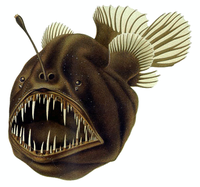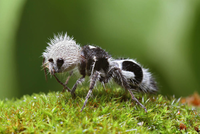
A hypothesis to explain accuracy of wasp resemblances
Sign Up to like & getrecommendations! Published in 2017 at "Ecology and Evolution"
DOI: 10.1002/ece3.2586
Abstract: Abstract Mimicry is one of the oldest concepts in biology, but it still presents many puzzles and continues to be widely debated. Simulation of wasps with a yellow‐black abdominal pattern by other insects (commonly called… read more here.
Keywords: insects; explain accuracy; hypothesis explain; mimicry ... See more keywords

Aggressive mimicry in a coral reef fish: The prey's view
Sign Up to like & getrecommendations! Published in 2020 at "Ecology and Evolution"
DOI: 10.1002/ece3.6883
Abstract: Abstract Since all forms of mimicry are based on perceptual deception, the sensory ecology of the intended receiver is of paramount importance to test the necessary precondition for mimicry to occur, that is, model‐mimic misidentification,… read more here.
Keywords: prey; coral reef; model; mimicry ... See more keywords
On the evolution of mimicry in avian nestlings
Sign Up to like & getrecommendations! Published in 2022 at "Ecology and Evolution"
DOI: 10.1002/ece3.8842
Abstract: Abstract Batesian mimicry (BM), where a nontoxic species resembles a toxic species with aposematic coloring, has been recently described for a Neotropical species of the suboscine passerine (Laniocera hypopyrra). Understanding the order and series in… read more here.
Keywords: mimicry; antipredator; evolution; laniisominae clade ... See more keywords

Red‐backed shrike (Lanius collurio) versus common cuckoo (Cuculus canorus): An example of ineffective cuckoo–hawk mimicry
Sign Up to like & getrecommendations! Published in 2022 at "Ecology and Evolution"
DOI: 10.1002/ece3.9664
Abstract: Abstract The red‐backed shrike (Lanius collurio) used to be one of the most common hosts of the common cuckoo (Cuculus canorus). Nevertheless, during the last 30 years, there is increasing evidence from Central Europe that the… read more here.
Keywords: mimicry; lanius collurio; backed shrike; cuckoo ... See more keywords

The predator’s new clothes: juvenile Plectropomus maculatus, a mimic of Scolopsis monogramma
Sign Up to like & getrecommendations! Published in 2018 at "Coral Reefs"
DOI: 10.1007/s00338-018-01746-9
Abstract: Mimicry is a commonstrategyamongcoral reeffishes that use diversemorphological features and behaviors to avoid predators or to increase successful foraging. Juvenile coral trout (Plectropomus spp.) strongly rely on coral habitat for food, shelter, andnurserygrounds (Wen et… read more here.
Keywords: coral trout; maculatus; monogramma; juvenile plectropomus ... See more keywords

Are Vocal Pitch Changes in Response to Facial Expressions of Emotions Potential Cues of Empathy? A Preliminary Report
Sign Up to like & getrecommendations! Published in 2017 at "Journal of Psycholinguistic Research"
DOI: 10.1007/s10936-016-9446-y
Abstract: Previous research has demonstrated that even brief exposures to facial expressions of emotions elicit facial mimicry in receivers in the form of corresponding facial muscle movements. As well, vocal and verbal patterns of speakers converge… read more here.
Keywords: pitch; vocal pitch; facial expressions; expressions emotions ... See more keywords

Empowering Mimicry: Female Leader Role Models Empower Women in Leadership Tasks Through Body Posture Mimicry
Sign Up to like & getrecommendations! Published in 2019 at "Sex Roles"
DOI: 10.1007/s11199-018-0911-y
Abstract: In two studies we investigated the behavioral process through which visible female leader role models empower women in leadership tasks. We proposed that women tend to mimic the powerful (open) body postures of successful female… read more here.
Keywords: leadership; female leader; leader role; role models ... See more keywords

Vascular mimicry: Triggers, molecular interactions and in vivo models.
Sign Up to like & getrecommendations! Published in 2020 at "Advances in cancer research"
DOI: 10.1016/bs.acr.2020.06.001
Abstract: Vascular mimicry is induced by a wide array of genes with functions related to cancer stemness, hypoxia, angiogenesis and autophagy. Vascular mimicry competent (VM-competent) cells that form de novo blood vessels are common in solid… read more here.
Keywords: mimicry triggers; metastasis; blood; mimicry ... See more keywords

Syntactic chameleons: Are there individual differences in syntactic mimicry and its possible prosocial effects?
Sign Up to like & getrecommendations! Published in 2018 at "Acta psychologica"
DOI: 10.1016/j.actpsy.2018.08.018
Abstract: This study investigated whether syntactic mimicry leads to prosocial effects and whether any such effects are modulated by personality traits. Participants and a confederate of the experimenters took turns describing simple scenes. Target scenes could… read more here.
Keywords: syntactic chameleons; prosocial effects; effects syntactic; syntactic mimicry ... See more keywords

Spiders mimic the acoustic signalling of mutillid wasps to avoid predation: startle signalling or Batesian mimicry?
Sign Up to like & getrecommendations! Published in 2020 at "Animal Behaviour"
DOI: 10.1016/j.anbehav.2020.10.015
Abstract: The importance of vision-reliant defensive traits (e.g. warning colours) in mimicry studies is well established, but their effectiveness is limited by visibility. In low light conditions, for instance, acoustic or tactile channels may be more… read more here.
Keywords: mutillid wasps; stridulation; wasps; spiders mimic ... See more keywords

Friends in Low Places: Intestinal Commensals Limit Colitis through Molecular Mimicry
Sign Up to like & getrecommendations! Published in 2017 at "Cell"
DOI: 10.1016/j.cell.2017.09.053
Abstract: Inflammatory bowel disease is thought to arise from inappropriate inflammation to gut bacteria, yet mechanisms preventing these responses remain elusive. In this issue of Cell, Nanjundappa et al. report that Bacteroides share an epitope with a… read more here.
Keywords: low places; friends low; intestinal commensals; molecular mimicry ... See more keywords